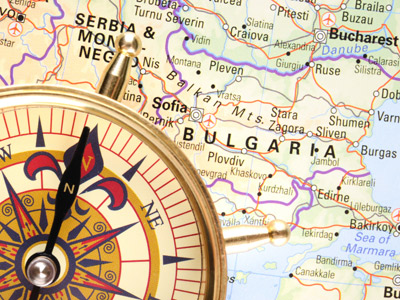
Ask the AI Tutor
Need help with World War One: 1914-18 - Alps, Balkans And Campaigns Against The Ottoman Empire? Ask our AI Tutor!
AI Tutor - Lucy
Connecting with Tutor...
Please wait while we establish connection

Bulgaria joined the war on the side of the Central Powers, in 1915.
World War One: 1914-18 - Alps, Balkans And Campaigns Against The Ottoman Empire
This GCSE History quiz explores the First World War in the Alps, the Balkans and against the Ottoman Empire, where geography, hardship and strategy all shaped the fighting.
1 .
In 1915 British and Imperial forces landed on the Gallipoli Peninsula in an attempt to eliminate Turkey from the war. What name was given to the strait separating European Turkey from Asiatic Turkey, over which they hoped to seize control?
The Sea of Marmora
The Bosphorus
The Golden Horn
The Dardanelles
This crucial strait controlled access from the Mediterranean to the Black Sea. If Turkey could be defeated, then Russia could be re-supplied through the Straits
2 .
In the autumn of 1918 a decisive battle took place between Italy and Austria, in which the Austrians had to concede defeat. Soon after this Austria-Hungary sued for peace, and the Austro-Hungarian Empire was no more. Where did this final "crunch" battle take place?
Vittorio Veneto
Bolzano
Udine
Bergamo
Forces had to be re-deployed from the Western Front in order to bolster the Italian effort in the Alps. However, by 1918 cracks were beginning to show in the cohesion of the Austrian Empire, as minority ethnic group after minority ethnic group aspired to independence
3 .
Which British general seized Jerusalem from Turkish control in 1917, encouraging Jews from all over the world to consider settling in the Holy Land?
Allenby
Hamilton
Plumer
Smith-Dorrien
The British were keen to approach the core of the Ottoman Empire in a three-pronged attack. The left flank was the regular British army invading from Egypt, the central thrust was Lawrence of Arabia's irregular Arab force, and the right flank was covered by British and Indian troops, advancing up the valleys of the Tigris and the Euphrates
4 .
Fighting also took place in Mesopotamia (present day Iraq), where British forces suffered a major defeat at the hands of the Turks. Where did this defeat take place in 1915-16?
Kut
Megiddo
Deraa
Fallujah
The Turks assembled a formidable force, determined to deny British and Imperial forces access to the "fertile Crescent"
5 .
Bulgaria decided to join the Central Powers after she was promised by Germany the territory along the Aegean coast that the great powers had denied her during the Nineteenth Century. In which Great War year did this event take place?
1915
1916
1914
1917
Bulgaria had originally been part of the Turkish Empire. However, while the Powers were sympathetic to Bulgarian aspirations, they would not countenance any Bulgarian presence on the Aegean coastline - they feared that a Russian naval presence would follow not far behind
6 .
Where was the treaty signed which brought Italy into the war on the side of Britain and France?
Paris
London
Rome
Florence
Italy had originally been a member of the Triple Alliance (Germany, Austria-Hungary and Italy) from 1882. However, Italian designs on Austrian territory began to loom larger, and Italian leaders believed that the Central Powers could be defeated by a Quadruple Entente involving Britain, France, Russia and Italy
7 .
Greece finally embraced the Allied cause in 1917, but British and French troops had been present in Northern Greece since the previous year. Around which town had they been concentrated?
Cavala
Salonika/Thessaloniki
Alexandropouli
Delphi
Greek politics was complicated, and the King was prone to intervene. Much of the Greek elite was sympathetic to the Central Powers, but support for the Entente was growing
8 .
Which Turkish general made his name at Gallipoli in 1915, and later became Turkey's modernising ruler?
Mustafa Kemal
Murad
Suleiman
Erdogan
A new generation of "Young Turks" blamed the defeat in the Great War on an older generation of rulers, including the Sultans in power. Young army officers were determined to seize the military and political initiative before Turkey was humiliated yet again
9 .
Which Balkan state joined the Western Allies in August 1916?
Romania
Bulgaria
Montenegro
Albania
The Balkans was a swirling mix of rivalries - especially as the Ottoman foothold seemed about to disappear. There were Slavs (Bulgars, Serbs and Macedonians), Latins (Romanians) and others, like Greeks and Albanians. There were also strong religious differences: Muslims in Bosnia and Albania, Orthodox Christians in Romania and elsewhere
10 .
A series of no less than 11 battles raged along a river, that rose in the Alps, between 1915 and 1917. After which river were these battles named?
The Adige
The Piave
The Po
The Isonzo
The fighting on the Alpine front was always bitter. Troops were expected to operate at high altitudes, and Austrian forces often had the better of their Italian adversaries
**Unlimited Quizzes Await You! 🚀**
Hey there, quiz champ! 🌟 You've already tackled today's free questions.
Ready for more?
Ready for more?
🔓 Unlock UNLIMITED Quizzes and challenge yourself every day. But that's
not all...
not all...
🔥 As a Subscriber you can join our thrilling "Daily Streak" against other
quizzers. Try to win a coveted spot on our Hall of Fame Page.
quizzers. Try to win a coveted spot on our Hall of Fame Page.
Don't miss out! Join us now and keep the fun rolling. 🎉
**Unlimited Quizzes Await You! 🚀**
Hey there, quiz champ! 🌟 You've already tackled today's free questions. Ready for more?
🔓 Unlock UNLIMITED Quizzes and challenge yourself every day. But that's not all...
🔥 As a Subscriber you can join our thrilling "Daily Streak" against other quizzers. Try to win a coveted spot on our Hall of Fame Page.
Don't miss out! Join us now and keep the fun rolling. 🎉






